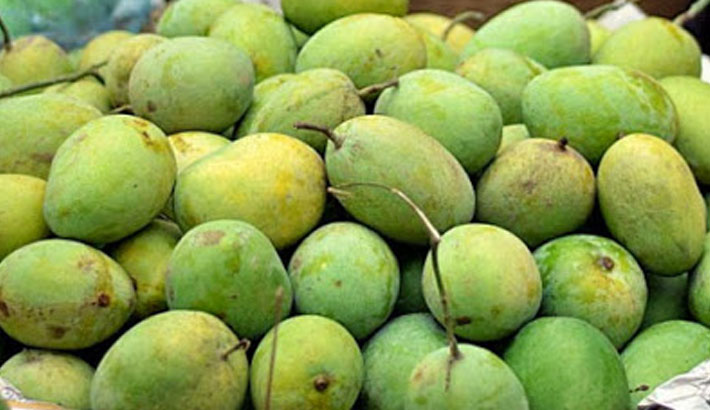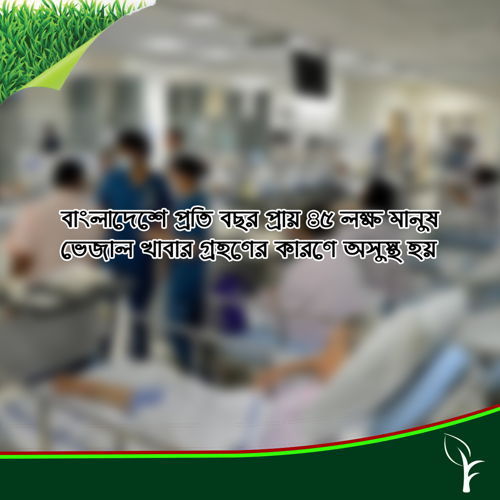
In Bangladesh, most of the manufactured or processed foods are deemed unsafe for consumption. In 2015, the findings released by the Ministry of Health's National Food Safety Laboratory confirm it. Food manufacturers, processors, restaurants, fast food outlets and so forth are all involved in one way or another in this corrupt practice of adulteration.
This contributes to the public health with many chronic and non-chronic diseases. Common examples include: lead in turmeric; formalin in fruit; fatal food poisoning after eating watermelon; high residues of banned pesticides; and chemical preservatives in fresh produce samples from local markets in Dhaka.
It is widely believed that farmers are using a mixture of toxic chemicals to fight pests. Foods are adulterated by using various harmful chemicals and toxic artificial colors, to extend its shelf life. Using chemical preservatives without concern for the health of the consumer is rampant.
On the other hand, food turning to be poisonous are stored, sold and served to consumers in an unhygienic atmosphere. Doing this causes contamination by microorganisms, leading to acute food poisoning cases in consumption of fruit.
WHO estimates that more than 2 million people die each year from diarrhea disease contracted from contaminated food and water. Data from the ICDDR, B indicates 501 hospital visits per day for treatment of diarrhea that were food and waterborne causes. The general scenario on food contamination is due to widespread non-compliance with hygienic practice in food handling. It is rampant in both food producers and food traders such as street food traders.
It’s not Bangladesh and other LDCs suffering from food safety issues. According to a 2012 report from researchers, foodborne illness costs the U.S. more than $14 billion annually. And a 2011 report from the CDC reported an estimated 9.4 million cases of foodborne illness each year. In total, foodborne illnesses contribute to 48 million illnesses annually.
The informal food production and marketing system are still strong in most countries of the South-East Asia Region. As a result, instances of food adulteration and contamination can occur due to lack of regulations. Street food is popular in urban settings in many countries. They provide cheap and enjoyable food to millions of consumers, particularly the general public. 1993 WHO survey of 100 street foods in 100 countries revealed the major health threat facing the public comes from raw and undercooked food, infected food handlers and inadequate hygiene measures in processing and storing such food.
Pure Food Courts in all over Bangladesh and three special Courts in Dhaka deal with the matters arising out of various food safety and food adulteration issues. From 2010 to 2014, of 7415 food samples that the Pure Food Court investigated, 3017 (40.69%) were found and certified as adulterated.
At a seminar organized by (DCCI), Dr. Zia Rahman, chairman of the criminology department at Dhaka University, spoke about the current scenario of food adulteration. Before the last Ramadan, the Institute of Public Health (IPH) randomly collected 640 samples of 51 different kinds of food items. It found that adulteration took place in 183 samples of 30 different food items, he said. The highest adulteration took place in the case of soybean oil (21 out of 28 samples). Moreover, adulteration was found in all the samples of salt, turmeric powder, honey, biscuits, pulses, vermicelli, jelly, ghee and dalda. The extent of food adulteration remained 40-54% during 1995-2011.

1. Safe food means tastier food - you won’t have to wail over rotten food you discovered at the end of the week. By practicing proper preservation guidelines you can have the best food experiences. It can be as simple as storing food at the proper temperature and at the right time.
2. Food gone bad isn’t of use to anyone. Nor is it healthy. We mostly consume food to add nutrition to our body. Eating decaying foods do not have any benefits (other than saving money and getting most out of it)
3. Thawing meat and poultry products at room temperature and partial cooking can encourage bacterial growth. Chucking a frozen chicken into a pot will save you time but think of all the bacteria you’ll be cooking too.
4. Foodborne illness costs billions each year in health care costs. And you lose hard-earned wages on something you could have prevented. You will save yourself and your family from a painful series of illnesses. Bacterial, parasitic or viral illness caused by food can have long-term consequences.
The main purpose of all preservation techniques is to restrict food from going bad. Whether carried out in the home or commercially, it's done so that food can safely use at a later time and you can properly reap the benefits all the food has to offer. It prolongs the food’s life longer, to boot!
As common people, the law is not in our hands - usually. The most we can do is change our usual vendors by testing the food we take from them. Certain tests are can be administered for common household foodstuffs.
Milk from local vendors is usually adulterated by water. Put a drop of milk on the polished vertical surface. The drop of pure milk either stops or flows slowly leaving a white trail behind it. Whereas milk adulterated with water will flow immediately without leaving a mark. This should give you enough awareness to confront the local seller and seek other vendors, particularly packaged pasteurized milk. Sugar is mixed with chalk shavings to give it more weight. Dissolve sugar in a glass of water, chalk will settle down at the bottom, similarly for salt. (footnote 4)
As a country where kids are brought up drinking tea instead of milk (sometimes), it profitable to make tea more profitable. Tea leaves are colored with artificial colorants to give it more hard "liquor color". Rub leaves on white paper, artificial color comes out on paper. Used tea is also recycled - used tea leaves sprinkled on wet filter paper will render it pink or red spots.
Naturally, as south-Asians, we love our spices. Not a single household goes by without it (virtually impossible). Ground spices are adulterated with powdered bran and sawdust. If you sprinkle some on the water surface, powdered bran and sawdust float on the surface. (visit this link for a detailed testing list).
Apart from testing, which can get very tedious and tiring, these following things you can easily do:
-
Notes:
1. Retrieved from: http://www.lawjournalbd.com/2015/06/food-adulteration-the-bangladesh-paradox-3/
2. Retrieved from: https://www.thedailystar.net/city/check-food-adulteration-price-manipulation-1563028
3. Retrieved from: https://www.ncbi.nlm.nih.gov/pmc/articles/PMC4221451/
4. Retrieved from: http://ficci.in/events/21353/ISP/Food%20adulteration%20U%20K%20Saxena%20Jaipur.pdf
